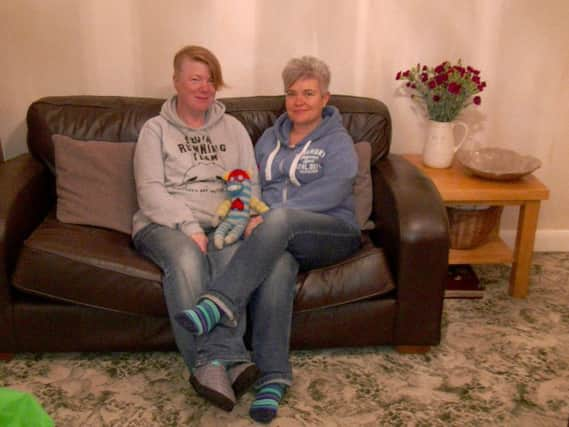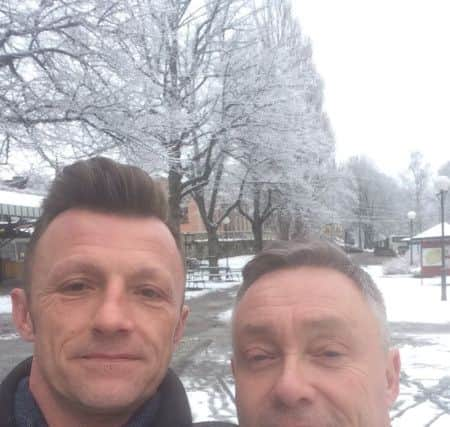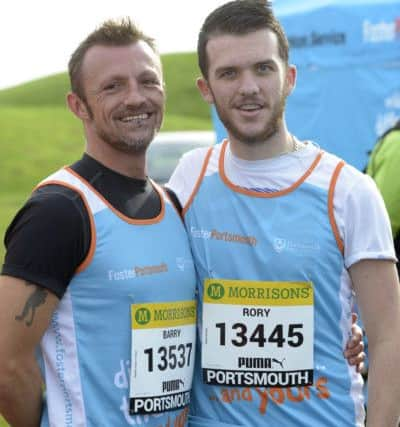Celebrating same-sex adoption couples


This week is national LGBT adoption and fostering week, so we’re taking a look at how same-sex couples are helping children in our area.
It’s more than 10 years since same-sex couples were legally allowed to adopt and foster children, but some people are still surprised it’s an option for them.
Advertisement
Hide AdAdvertisement
Hide AdPortsmouth City Council works to raise awareness of this fact with members of the LGBT community and urge them to consider changing the life of a child or young person.


Cllr Ryan Brent, the council’s cabinet member for children’s social care said: ‘There are a lot of misconceptions about who can adopt and foster, not just around sexuality.
‘People don’t realise you can adopt or foster regardless of sexuality, ethnicity, whether single or part of a couple, or whether you own or rent your own property; we just want people who can help give children a loving, stable home.’
JUDITH AND NICKY’S STORY
Judith and her wife Nicky, from outside the city, adopted two young siblings.


Advertisement
Hide AdAdvertisement
Hide AdThey had always wanted children but didn’t think it would become a reality.
Like many people they came to the decision to adopt after considering their options for a number of years and before speaking to Portsmouth City Council had experienced some negativity.
Judith says: ‘We had considered many alternative possibilities, including fostering, what with us both working in education and having experience with younger children, teenagers, and children with complex needs, but we agreed that we still wanted children of our own, so looked into IVF and saw various adoption agencies.
‘We were discouraged by some of the adoption agencies, who seemed to be saying, in a less than fully welcoming way, ‘as the law has changed, we have to consider you as potential adopters now’, and we tried several rounds of unsuccessful IUI and IVF.


Advertisement
Hide AdAdvertisement
Hide Ad‘After several years, we enquired again about adoption, this time though Portsmouth City Council, finding them open, honest and welcoming, and we have never regretted our choice to adopt through them.
‘For many years we thought having children was just not going to happen. Our choice to adopt was partly down to being unsure whether having our own birth child was possible, but also having an awareness of just how many children in care need a forever home.’
Judith and Nicky were unsure at the beginning of the process about the age of child they wanted to adopt, or whether they wanted to adopt siblings, but are glad they decided to adopt two children beyond baby ages.
Judith adds: ‘We think it is such a positive to have the instant family that we always wanted, and to have skipped the baby phase where they need feeding every few hours throughout the night!’


Advertisement
Hide AdAdvertisement
Hide AdIf a couple, or single person, adopts a child, it is expected that someone will take a significant period of time off work, even if the child is of school age, to help them settle into their new environment.
Judith said: ‘Initially Nicky took a full year off of work, and I took paternity leave. They are very well settled now, both at home and in their schooling, so we have returned to full-time work and share the parenting responsibilities equally. Nicky does the sporty and practical stuff with them, and as the creative one I do more of the arts and crafts activities, so we play to our strengths as a couple.’
Cllr Brent adds: ‘We need more people to come forward to adopt or foster the children and young people we have in care, especially children aged three and above and teenagers, and we are especially keen to speak to people who have existing skills and experience of working with children or young people, whether personal, professional or voluntary.’
DEAMONN AND BARRY’S STORY
Deamonn and partner Barry have been Portsmouth foster carers for the last six years.
Advertisement
Hide AdAdvertisement
Hide AdThey initially considered adoption, but decided they were more suited to fostering.
Deamonn says: ‘We were unsure if being gay meant we couldn’t foster, but were warmly welcomed.
‘Seeing Rory, the young man we foster, develop into such a nice, well-rounded guy, get his first job, run a successful side business and do so well in his A-levels has been simply wonderful.
‘I think myths still exist in the LGBT community that you can’t adopt or foster, so anything that can be done to break down these barriers is a good thing, as I think there are probably lots of gay people would make good parents, but are held back through concerns over prejudice.
Advertisement
Hide AdAdvertisement
Hide Ad‘I’m happy to say that we’ve genuinely never experienced any negative reactions, and our friends and family are so supportive.’
TANIA AND CATHERINE’S STORY
Tania, and her partner Catherine, from Portsmouth, have been foster carers for four years, caring for four children during that time. They both worked professionally with children and had a strong desire to be parents, deciding on fostering through an awareness of the high numbers of children and young people in care who need a safe and loving home.
Tania says: ‘We could see from the recruitment information that people from the LGBT community were welcome, and as we wanted to foster younger children we needed to work out how we would do everything for any child that a birth family would.
‘My partner went to part-time hours in order to be available for things like the school run. I continue to work full-time, albeit in a different job, so the other benefit of fostering is that it enables me to continue to work with children, which I really love.
Advertisement
Hide AdAdvertisement
Hide Ad‘We wanted to be short-term foster carers, to focus on giving a safe home to many children before they moved on to their next step. However, we have also taken on long-term care of a child.’
Tania and Catherine see fostering as fulfilling their desire to be parents, with Tania adding: ‘Fostering is just parenting, whether you are gay or straight, with lots of the same challenges parents of birth children experience.
‘Busy lives, and finding time for each other, are challenges for any couple with children.
‘Of course fostering can be challenging.
‘Helping a child see beyond any anger they may have, enabling them to find a more positive way to deal with feelings and to make sense of what has happened to them can be hard at times, but it is always extremely rewarding, and fun.
Advertisement
Hide AdAdvertisement
Hide Ad‘Parenting is a big commitment, and not for everyone, and in that way fostering is not just a job, but also a lifestyle.
‘The main difference we see with considering becoming a foster carer is that not everyone wants to parent someone else’s child and perhaps risk having to give them up at some point down the line, once you have helped them move on to the next phase of their lives.
‘It would be great if more people from the LGBT community came forward to adopt or foster children and young people, but I think, rather than any potential prejudices being present in wider society, not having enough time to commit to foster is the biggest issue preventing more coming forward.
‘Support from friends and family is important, as without it, the day-to-day challenges could become overwhelming.
Advertisement
Hide AdAdvertisement
Hide Ad‘Making time for friends, family and your partner is of course important for your own health.
‘There may always be prejudice around gay people adopting or fostering children and young people from some people in society, but it’s important to focus on the positive support that’s out there.
‘Many, many people respect foster carers, irrespective of sexuality, simply for the positive difference they can make to a young person’s life.’